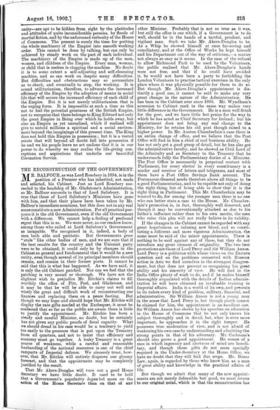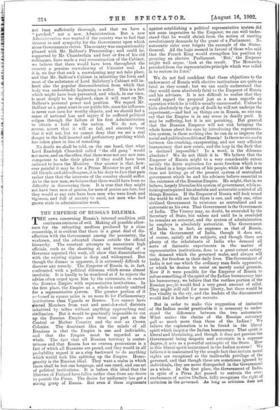THE RECONSTRUCTION OF ' IHE GOVERNMENT.
MR. BALFOUR, as was Lord Rosebery in 1894, is in the position of a Premier who has inherited, not made and selected, his Cabinet. Just as Lord Rosebery suc- ceeded to the headship of Mr. Gladstone's Administration, so Mr. Balfour succeeds to that of Lord Salisbury. It is true that three of Lord Salisbury's Ministers have gone with him, and that their places have been taken by Mr. Balfour's immediate nominees, but this does not in any real sense constitute a new Administration. For all practical pur- poses it is the old Government, even if the old Government with a difference. We cannot help a feeling of profound regret that this is so. We were never, as our readers know, among those who railed at Lord Salisbury's Government as incapable. We recognised in it, indeed, a body of men both able and patriotic. But Governments grow " stale " like other bodies of men, and we are sure that if the best results for the country and the Unionist party were to be obtained, it could only be by changes in the Cabinet so general and fundamental that it would be a new entity, even though several of its principal members should. remain, and remain in their former posts. It cannot be said that this is what has happened. As we have said, it is only the old Cabinet patched. Nor can we feel that the patching is very sound or thorough. We have not the slightest wish to prejudice Mr. Ritchie's claims to fill worthily the office of Pitt, Peel, and Gladstone, and it may be that be will be able to carry out well and wisely the great and difficult work of reconstructing our finances and replacing them on a peace footing. But though we may hope and should hope that Mr. Ritchie will display the rare gifts needed at the Exchequer, it must be confessed that so far as the public are aware there is little to justify the appointment. Mr. Ritchie has been a steady and careful Minister, no doubt, but he certainly has not given any public proofs of fiscal capacity. What we should dread in his case would be a tendency to yield too easily to the pressure that is put upon the Treasury from all quarters, and not to insist that efficiency and economy must go together. A leaky Treasury is a great source of weakness, while a careful and reasonable husbanding of the national resources is one of the chief ramparts of Imperial defence. We sincerely trust, how- ever, that Mr. Ritchie will entirely disprove our gloomy forecast, and. that the appointment may be completely Justified by the result.
That Mr. Akers-Douglas will turn out a good Home Secretary we have little doubt. It used to be held that a Government's popularity depended more on the action of the Home Secretary than on that of any other Minister. Probably that is not so true as it was, but still the office is one which, if a Government is to do well, should be in the hands of a tactful, prudent, and vigilant man. Such we take Mr. Akers-Douglas to be.
As a Whip he showed himself at once far-seeing and conciliatory, and at the Office of Works he kept himself and his Department out of the way of criticism,—a matter not always so easy as it seems. In the case of the refusal to allow Richmond Park to be used by the Volunteers, the public realised that Mr. Akers-Douglas's hands were not free, and that if he could have avoided. it, he would not have been a party to forbidding the London Volunteers to practise tactical exercises in the only place where it was physically possible for them to do so. But though Mr. Akers-Douglas's appointment is dis- tinctly a good one, it cannot be said to make any very great change in the nature of the Administration. He has been in the Cabinet ever since 1895. Mr. Wyndham's accession to Cabinet rank in the same way makes very little difference in the Government. He is a man well fitted for the post, and we have little but praise for the way in which he has acted as Chief Secretary for Ireland ; but his appointment does not bring any real change to the Ministry, for he retains his old post though raised to a. higher power. In Mr. Austen Chamberlain's case there is an entire change of office, and we believe that the Post Office will find. in him a chief of real business ability. He has not only got a good grasp of detail, but he has also got the administrative faculty, and he showed as Civil Lord of the Admiralty and as Secretary to the Treasury that he understands fully the Parliamentary duties of a Minister. The Post Office is necessarily in perpetual contact with Parliament, for every elector in every constituency is a sender and receiver of letters and telegrams, and most of them have a Post Office Savings Bank account. The Postmaster-General needs therefore above all things to be a good Parliamentarian, and to be capable not only of doing the right thing, but of being able to show that it is the right thing in Parliament. This Mr. Chamberlain may be trusted to do, for among the younger men there is no one who can better state a case to the House. Mr. Chamber- lain's promotion is, in fact, thoroughly well deserved, and though it may be conventionally attacked as due to his father's influence rather than to his own merits, the men who raise this plea will not really believe in its validity.
If the changes in the Cabinet cannot be regarded with any great hopefulness as infusing new blood, and so consti- tuting a different and more vigorous Administration, the same must be said of the minor appointments. There is nothing to be said against any of these, but they do not introduce any great element of originality. The two best promotions are those of Lord Percy and Sir William Anson. Lord. Percy is a politician with whose views on the Eastern question and on the problems connected with Russian action in Asia we find ourselves in the strongest disagree- ment, but that does not prevent us recognising his great ability and his sincerity of view. He will find in the India Office plenty of work to do, and if he makes himself thoroughly acquainted. with the details of Indian adminis- tration he will have obtained an invaluable training in Imperial affairs. India is a world of its own, and presents to its rulers every kind of problem, military, financial, and administrative. Sir William Anson is not a young man in the sense that Lord Percy is, but though youth cannot be claimed for him, the appointment is an excellent one. Sir William Anson has shown by his speeches on education in the House of Commons that he not only knows his subject thoroughly and in detail, but, what is even more important, he approaches it in the right temper. He possesses true moderation of view, and is not afraid of weakening his own case by understanding and admitting the strong points in that of his adversary. Mr. Cochrane's should also prove a good appointment. He comes of a race in which ingenuity and alertness of mind are heredi- tary, and though those gifts do not seem specially required in the Under-Secretary at the Home Office, we have no doubt that they will find due scope. Mr. Boum Law, again, is regarded by those who know him as a man. of great ability and knowledge in the practical affairs of life.
But though we admit that many of the new appoint- ments are not merely defensible but good, we must return to our original point, which is that the reconstruction has not been sufficiently thorough, and that we have a " patched," not a new, Administration. But a new Administration was wanted if the country was to feel that interest in and sympathy for the Government upon which alone Governments thrive. The country was unquestionably pleased with Mr. Balfour's Premiership ; and could he, supported by Mr. Chamberlain and four or five of his old colleagues, have made a real reconstruction of the Cabinet, we believe that there would have been throughout the country a genuine reawakening of Unionist zeal. As it is, we fear that such a reawakening may not take place, and that Mr. Balfour's Cabinet in inheriting the form and most of the substance of Lord Salisbury's Cabinet will in- herit also the popular disconsideration from which that body was undoubtedly beginning to suffer. This is a fact which might have been prevented, and which, in our view, is most deeply to be deplored, since it will react on Mr. Balfour's personal power and position. We regard Mr. Balfour as a great asset in our public life, since his influence is never cast save for worthy objects, and we should feel a sense of national loss and injury if he suffered political eclipse through the failure of his first Administration to obtain a hold on the nation. We do not, of course, assert that it will so fail, and sincerely trust that it will not, but we cannot deny that we see a real danger in the half-hearted and perfunctory patching which has taken place in lieu of remaking.
No doubt we shall be told, on the one hand, that what Lord Randolph Churchill called " the old gang " would not move, and on the other, that there were not any new men competent to take their places if they could have been induced to leave the Ministry. Our answer is that, how- ever painful it may be for a Prime Minister to get rid of old friends and old colleagues, it is his duty to face that pain rather than that the interests of the country should suffer. As to the new men, we believe that there would have been no difficulty in discovering them. It is true that they might not have been men of genius, for men of genius are rare, but they would at any rate have been men who were fresh and vigorous, and full of anxiety to excel, not men who had grown stale in administrative work.



































 Previous page
Previous page